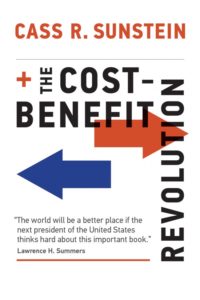
From 2009 to 2012, [Cass] Sunstein headed the Obama administration’s Office of Information and Regulatory Affairs (OIRA), the part of the executive branch that enforces the requirement for cost–benefit analyses of major government regulations. Seeing government up close often makes analytic people cynical, but that hasn’t been the case with Sunstein. He emerged from his almost four-year stint in Washington as a strong believer in the power of cost–benefit analysis to lead not only to answers but also to good outcomes. In this book, he lays out why and concludes that the cost–benefit revolution “may well turn out to be a transition to something far better, focused more directly on the measurement of human welfare and enlisting unimaginably ambitious strategies to capture and improve the real-world effects of public-sector initiatives.” When that happens, he closes, “There will be dancing at the revolution, and I’m coming.”
Unfortunately, he doesn’t fully make his case. To be sure, he makes a strong argument that cost–benefit analysis has the power to be good analysis. He also shows cases in which good analysis overcame political pressure. But for someone who was in his job when “four thousand regulations were under discussion,” he relates surprisingly little about those discussions when, to make his case, he needed to provide more than just some details about a handful of regulations. He also goes too easy on heads of government agencies, not acknowledging their evident bias. He even makes a simple but telling error in one of his examples of cost–benefit analysis, using an annual figure where he should have used a present value.
This is from David R. Henderson, “Sunstein Will Be Dancing, But Should He?“, Regulation, Winter 2018-2019, which has just been published. (Scroll down about half way.) It’s my review of his book The Cost-Benefit Revolution.
Also:
Sunstein also defends WTP [willingness to pay] on grounds that will appeal to those who favor freedom. He writes, “Government should allow people to make choices about how to allocate their resources, not necessarily because people know best, but because they should be treated as adults rather than as infants.” It’s particularly encouraging to see him write this because his well-known earlier view, expressed in his coauthored book Nudge, was that government should treat people as, well, maybe not infants, but not quite adults either. He has consistently thought that people make bad choices, but his defense of their right to make those choices is more full-throated than in his earlier work.
Read the whole thing, including the part where I discuss his and my telephone conversation.


READER COMMENTS
John Alcorn
Dec 24 2018 at 8:12pm
Robert Sugden (U. of East Anglia, UK) has penned incisive criticisms of Cass Sunstein’s (and Richard Thaler’s) longstanding case for government nudging. Sunstein likes to have it both ways, by painting government nudges as democratic self-paternalism, as though majorities express ‘laundered preferences’ at the ballot box, to protect themselves from backsliding in everyday life. However, Sugden explains that the evidence points to a different political psychology:
Even libertarians sometimes say, philosophically: We get the government we deserve.
Bryan Caplan has a ready retort: No, we get the government they [i.e., the majority] deserve!
Sugden highlights a different problem, paternalistic tyranny of the majority: We get the government that they [i.e., the majority] think we deserve.
Sunstein adduces survey evidence to support his claim that people have overarching preferences for self-paternalism through government. Sugden counters that (a) the specific survey evidence is vitiated by ‘framing’ (i.e., leading the witness), and (b) behavior in the wild, in situations where people can choose to bind themselves, is a surer indicator of overarching preferences:
Sugden’s article (open access) is available online here.
David Seltzer
Dec 27 2018 at 6:54pm
“Government should allow people to make choices about how to allocate their resources, not necessarily because people know best, but because they should be treated as adults rather than as infants.” Should allow??? No! Government is not my patron or parent. In the normative, individual rights,assuming no third party harm, are superior to the state. That logic means that the state is subordinate to the individual and therefore “allows” nothing.
Comments are closed.